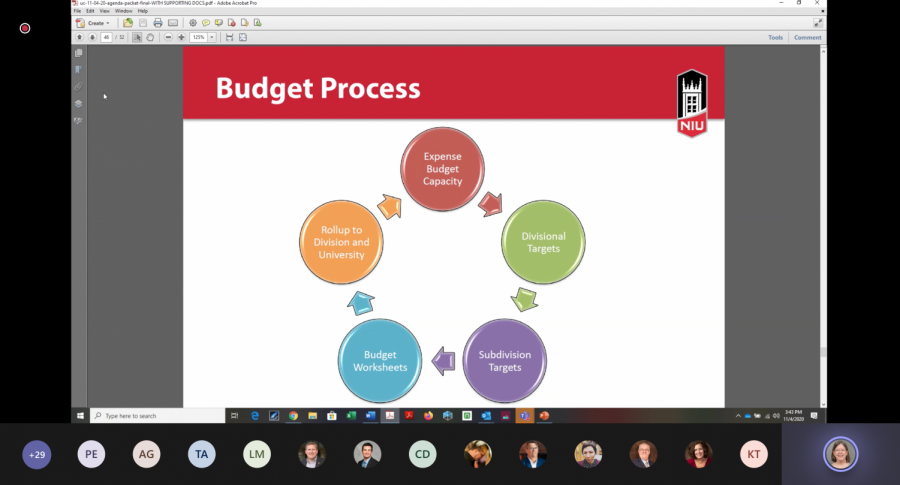University Council discusses budget process, ombudsperson gives report
Beth Ingram, executive vice president and provost and Chief Financial Officer Sarah Chinniah discuss the budget process during Wednesday’s meeting.
November 5, 2020
DeKALB – Members from the University Council met Wednesday for the annual report of the Ombudsperson Sarah Klaper, in addition to a budget report by Beth Ingram, executive vice president and provost and Chief Financial Officer Sarah Chinniah.
The report by the Ombudsperson gave an overview of common issues dealt with throughout the past year in addition to advice and strategies from the office to faculty.
Nearly 50 people were present in the Microsoft Teams meeting, including the council members. The Council fielded questions from the audience present in the meeting after the presentations were given.
During her report, Klaper said the previous school year saw a record number of mediations and facilitations, according to the Office of Ombudsperson.
“I was involved in 74 [disputes]. A lot of it was involving respect, ethical concerns, discrimination issues, fears,” Klaper said while discussing the source of the past school year’s mediations. “It all would generally come back to communication problems.”
The Office of the Ombudsperson is a body separate from the university’s formal administrative structure. It provides “confidential, impartial assistance to those with problems or concerns,” according to the Office’s official website. Assessing issues from a neutral standpoint, the office is meant to help identify possible solutions between both faculty members and the student body.
Issues the Office of the Ombudsperson were involved in among the university’s faculty often arose from things such as unprofessionalism in tone or manner and dishonesty, Klaper said.
Among issues involving students, disputes over balancing the university’s grading standards while maintaining a certain level of flexibility were very challenging, especially since the COVID-19 pandemic hit, Klaper said.
“It has always been an issue, but it is particularly a challenge now,” Klaper said. “We were seeing a lot of grade appeals from the spring semester and over the summer focused a lot on the issues relating to [COVID-19].”
The budget report also covered the financial repercussions of the pandemic.
“Closing a $30 million [budget] gap would have caused significant hardship so the conversations we had with different divisions were ‘What can you do,’” Chinniah said. “It was challenging and it was difficult but there were important conversations that occurred.
The budget report outlined the different sources from which the university’s funding comes and how the expense budget capacity is determined. It also addressed budgetary concerns caused by the pandemic and other general questions.
Besides addressing general concerns about how the pandemic affected the university finances, Chinniah and Ingram presented how the annual budget is determined, presented to the board to be approved, and then executed.
“The process doesn’t just end at the start of the year. Throughout the year, we look at and release items related to budget guidelines,” Chinniah said. “It is often more of an art than a science.







